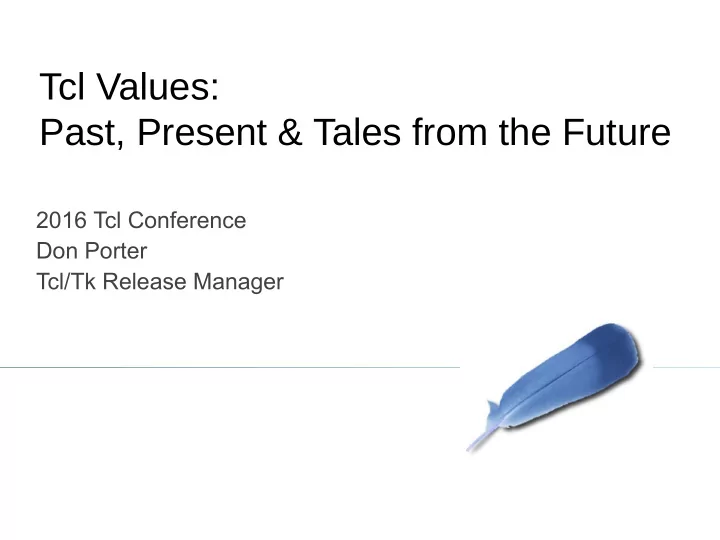

Tcl Values: Past, Present & Tales from the Future 2016 Tcl Conference Don Porter Tcl/Tk Release Manager
Why I Am Working on TIP 445. 2016 Tcl Conference Don Porter Tcl/Tk Release Manager
Tcl Value? ● R e t u r n e d b y c o m m a n d ● Stored in variable ● Passed as an argument ● Held in a list. set v [cmd arg]
Tcl Foundations int main(int argc, char *argv[]) { return 0; } ● argv[i] points to NUL-terminated char array. ● Value: finite sequence of {0x01 – 0xFF}.
Tcl 7 Value argv →Tcl_CmdProc → Tcl_SetResult( result , freeProc) ● Establishes the semantics of Tcl values. – “Everything is a string” – Implies: no NULL value; names, not references; Tcl typing – Revisions can optimize, but not escape this model. ● Pros – matches C, familiar to extension writers ● Cons – Fails “8-bit clean” (and Unicode completeness) – Conversion burdens make things slow.
Tcl 8(.1) Value: Tcl_Obj objv →Tcl_ObjCmdProc → Tcl_SetObjResult( objPtr ) argv →Tcl_CmdProc → Tcl_SetResult( result , freeProc) ● objv[i] points to a Tcl_Obj struct (24 or 40 bytes each): {int refCount; char *bytes; int length; /* String Representation. */ Tcl_ObjType *typePtr; internalRep} /* Other Representation */ ● Internal Rep goes along for the ride – saves conversions. ● Tcl_ObjType (optionally) defines routines so Tcl can command... – Conversion Internal Rep to String Rep Tcl_GetString() – Free an Internal Rep Tcl_DecrRefCount(), Tcl_FreeIntRep() – Duplicate an Internal Rep Tcl_DuplicateObj() – Create an Internal Rep of the value (if possible) Tcl_ConvertToType() ● objPtr→bytes is Tcl 7 value. Easy accommodation of Tcl 7 conventions. – Revised encoding. Modified UTF-8 encodes entire BMP, including U+0000 – Lost freeProc! bytes is always ckalloc()ed. Always making copies!
Tcl 8 Value: The Stork Tcl_Obj struct: {refCount; bytes; length; /* String Rep */ Tcl_ObjType *typePtr; internalRep} /* Other Rep */ ● Either bytes or typePtr must be non-NULL. ● Both can be non-NULL, but then must agree. ● When bytes == NULL, say the value is “pure”. ● A New internalRep destroys an old one. (“shimmer”) – Conversion via string rep, or by being 'friends'
Tcl 8 Value: The Good ● All code written to Tcl 7 still works. ● Tcl 8 value resolves all Tcl 7 value cons!!! – M u c h r e d u c e d c o n v e r s i o n b u r d e n . – Binary-safe, Support of Unicode's BMP ● In practice, programmers accepted it. – Mmmmm…. Yummy carrots.
Tcl 8 Value: The Bad ● Unicode grew, Tcl value alphabet didn't. ● Inessential properties of Tcl_Obj – Limit capabilities – Burden evolution – Tcl's value model is consistent with many programming innovations while the properties of the Tcl_Obj struct are not. ● Pure functional, immutable data structures, HAMT, RRB trees, ropes. – Especially troublesome for large scaling.
Tcl_Obj: Inessential properties {refCount; bytes; length; /* String Rep */ Tcl_ObjType *typePtr; internalRep} /* Other Rep */ ● Size limited (INT_MAX = 2G) ● Open structs ● Mutable / Copy on Write ● RefCounted → Thread isolated. ● String Rep is Tcl 7 value without freeProc ● At most one additional Rep. (“hydra”) ● Each Rep is absent or complete. No partial conversions.
Example % proc K {x y} {return $x} % set x [string repeat a 3000000] % time {set x [string replace $x 2 2 b]} 100 2235.11385 microseconds per iteration % time {set x [string replace [K $x [unset x]] 2 2 b]} 100 4.20126 microseconds per iteration ● Impact of sharing is script visible.
Tcl 9 Value – New Struct? valv →Tcl_ValCmdProc → Tcl_SetValResult(val) objv →Tcl_ObjCmdProc → Tcl_SetObjResult(objPtr) argv →Tcl_CmdProc → Tcl_SetResult( result , freeProc) ● Or is better encapsulated Tcl_Obj struct flexible enough? ● Needs experimentation and interfaces to support it.
TIP 445 ● Tcl_FreeInternalRep(obj) – Replaces obj→typePtr→freeIntRepProc(obj) ● Tcl_InitStringRep(…) – Replaces direct alloc and write to bytes ● Tcl_StoreIntRep(...), Tcl_FetchIntRep(…) – Act on internalRep without direct field access – Without assuming single internalRep ● ….and more as work reveals.
Tcl 9 value desirables? ● Code written to Tcl 7 and 8 should still work. ● Much increased sized limitations. ● Immutable ● Thread-sharable ● Reduced shimmer impact ● Full Unicode, with canonical equivalence ● Share data, not values
Closing Thoughts ● Should we invent a new structure or modify existing one? – How much can inessentials be purged without upsetting released base that assumes them? – Experiments in progress. ● Can changes be completed in reasonable time? – Interface first, for 9.0. – Continued progress in 9.1, 9.2, etc. ● Will coders accept and adapt? – Need big yummy carrots.
Recommend
More recommend